Man in his 30s with schizophrenia and manic-depression – Fecal microflora transplantation case report
Case presentation Male in his 30s, schizophrenia, manic-depression
summary
Mild to moderate improvement during transplant. (As soon as he returned home the same day of transplantation, he could recognize his surroundings). However, it is possible that the transplant effect could not be sustained due to convenience stores, smoking, etc. We will continue to provide additional explanations while monitoring the situation. The patient’s subjective symptoms are good during transplantation.Basic Information
| Patients : | Male in his 30s |
| Attending physician : | Grace Medical Clinic |
| Medical institution in charge of transplantation : | Grace Medical Clinic |
Information at the time of initial medical examination
| Disease name : |
Schizophrenia Manic Depression |
| At onset : | About 15 years old. |
| Transplant Purpose: To | Irritability, tantrums Fatigable Tiredness |
| Chief complaint : | He had symptoms of difficulty in thinking and was said to have adolescent crisis syndrome. Gradually, he began to withdraw from society. He has been taking medication for a long time. Delusions have been getting worse for the past 10 years. Depression turned into manic-depression and now only schizophrenic symptoms. I read a book and heard it was the effect of gut bacteria, so I used probiotics, but no change. I’ve also given him Lactobify, NOW’s Probio, Alpha Lipo, VitC, VitB, etc., but it hasn’t cleared up much. He now has many tic symptoms, poor comprehension, and gradual progression of symptoms. He says he is being manipulated both verbally and physically. |
| Medications being taken : | Lorazepam, Cicrest, Risperidone |
| Medical history : | |
| Background, family history, lifestyle, supplement use, etc : | tobacco |
Transplant Information
| Transplantation period: from | June 5, 2019 – November 25, 2019 |
| Number of transplants : | 6 times |
| Change from first transplant to end of transplant : |
| 【1st transplantation questionnaire】
(From the patient)
He is aware that he is getting a little better.
His stomach is not bad.
He can sleep at night. His appetite is normal.
His smoking has not increased.
(From his family) The more days pass, the calmer he becomes. He was stable when he came to the hospital.
His family is away more, but it doesn’t cause much of a problem.
Mentally, he says he is most calm now.
【2nd transplantation questionnaire】
(From a family member) I don’t think much changed this time …
It didn’t get worse, but it didn’t seem to get better.
(From the patient) The auditory hallucinations are a little better, but still remain.
He is still in an unstable mood because he can’t get rid of his problems.
People around him say things about him (auditory hallucinations).
The nature of his stools has not changed. No constipation or diarrhea. Appetite is stable.
【3rd transplantation questionnaire】 (From the patient) I STILL HAVE AUDITORY HALLUCINATIONS. SLEEPS WELL. I DON’T GET FRUSTRATED VERY MUCH. I FEEL ABOUT HALF BETTER. I AM GLAD I TRIED THE TRANSPLANT. I HAVE A BOWEL MOVEMENT EVERY DAY. (FROM FAMILY) I STILL HAVE AUDITORY HALLUCINATIONS. CONSCIOUSNESS SEEMS CLEARER. CIGARETTE SMOKING HAS INCREASED TO ABOUT 4 PACKS. TIC-LIKE SYMPTOMS ARE A LITTLE. I FEEL MUCH LESS TIC-LIKE SYMPTOMS. 【4th transplantation questionnaire】 SHE RESPONDED TO THE POMS2 QUESTIONNAIRE BY THINKING PROPERLY. DURING THE QUESTIONING, HE SAT DOWN TO ANSWER THE QUESTIONS, BUT SOMETIMES HE STOOD UP AND BECAME RESTLESS. TICS WERE ALSO OBSERVED FOR A FEW SECONDS. HE HAD A BOWEL MOVEMENT ONLY ONCE EVERY 2 DAYS, BUT IT WAS BANANA SHAPED. HE USED TO HAVE A BOWEL MOVEMENT EVERY DAY. 【5th transplantation questionnaire】 |
| Changes after completion of transplant : |
|
Bowel movements, fatigue, coldness, and swelling are improving.
Mood changes. (It’s getting better.) |
Evaluation and Discussion
| Transplant Evaluation : | Clear improvement of symptoms |
| Pre- and post-transplant flora balance test changes : | [Before implantation] June 2019 Implementation.
Lack of diversity
…C. cluster Blautia is too common. Bacteria increase to protect the host temporarily, but if it has been ongoing, it may have caused chronic inflammation
・C. cluster14ab, IV, and Blautia indicates sympathetic dominance and symptoms such as intense assumption, irritability, and insomnia.
Bacteroides is also present, but it requires a balanced intake of dietary fiber and animal protein from meat and fish in order to produce organic acids and send signals to the brain properly.
[None [during transplantation]. [Post-transplant] November 2019. Compared to pre-transplant, the diversity and balance of intestinal flora seems to be improving. However, the percentage of Other is increasing. I think a little follow-up is necessary. I would like you to pay attention to your lifestyle and eating habits. |
| Blood test changes : | No data |
| POMS2 SCORE CHANGE : | Nothing |
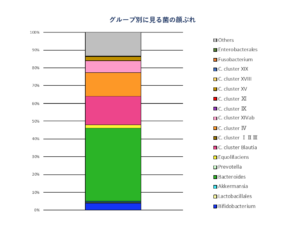
| His/her experience (from the questionnaire) : |
| No reply |
| Adverse events: No |
| Nothing |
| Transplant General Comments and Discussion : |
| Lack of diversity of intestinal bacteria. Consideration from each bacterium. Sympathetic nervous system dominance, which is evident in symptoms such as intense assumption, irritability, and insomnia. In order to produce organic acids and send signals to the brain properly, a balanced intake of dietary fiber and animal protein from meat and fish must be consumed. During the transplant, the patient appeared to be mildly to moderately improved. As soon as the patient left the same day of transplantation, the improvement was so obvious to those around her. |
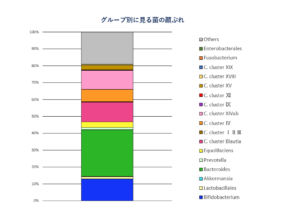
| His/her experience (from the questionnaire) : |
| No reply |
| Adverse events: No |
| Nothing |
| Transplant General Comments and Discussion : |
| Temporary improvement was observed with the transplant. A little, it did not seem to last long, and we will continue to monitor the changes. The family was glad they tried it. |
Related Videos
Deep relationship between the brain and intestines (brain-gut correlation) The knowledge essential for intestinal activity and improvement of the intestinal environment is explained in an easy-to-understand manner with animation! … and upwardsReturn to Top of Case Studies
その他の Intestinal flora transplantation and case studies に関する記事
Articles about other Intestinal flora transplantation and case studies
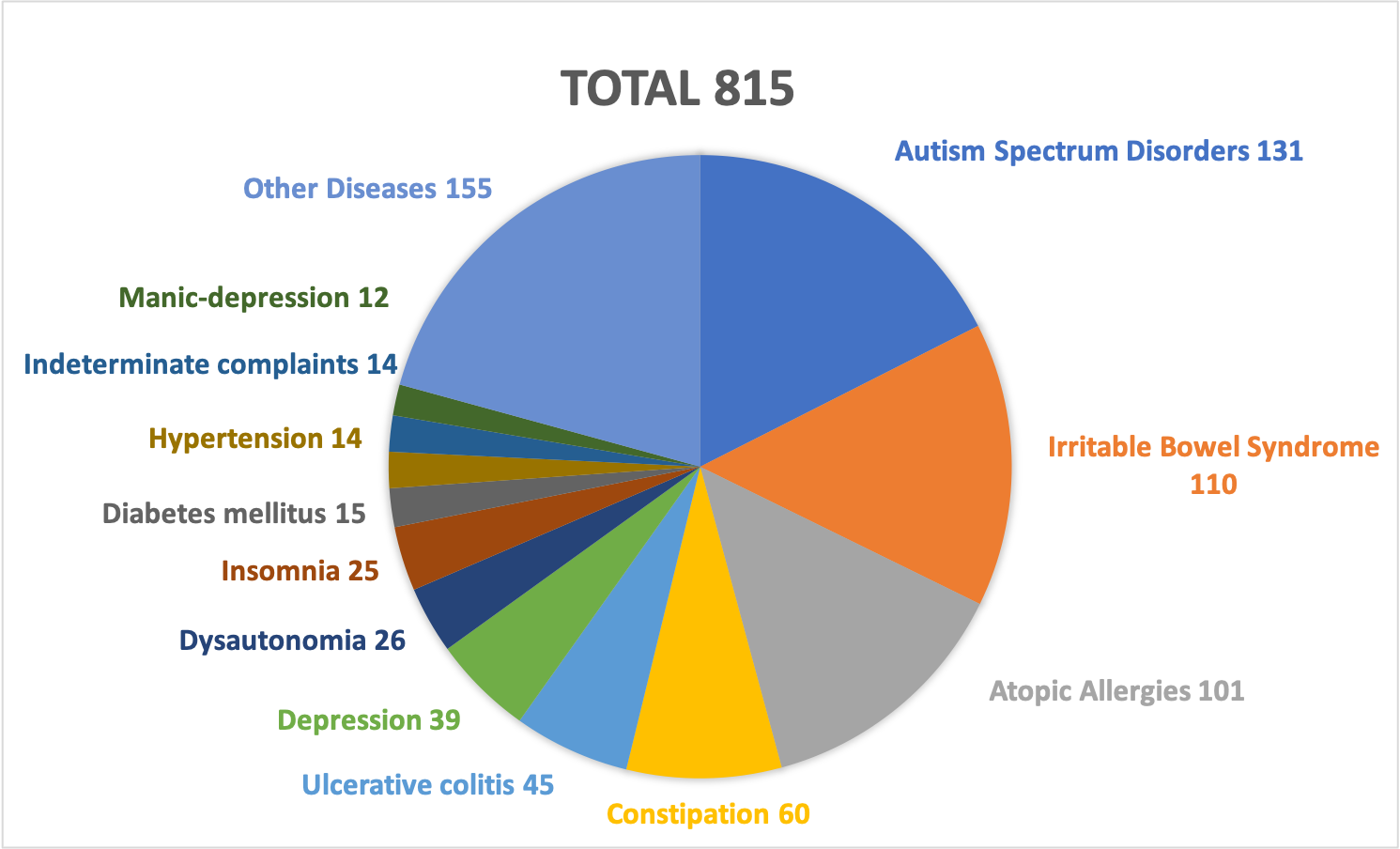
April 08, 2024
Fecal microbiota transplantation results〈as of April 1, 2024〉
Fecal microbiota transplantation results by case in our study group (as of April 1, 2024)
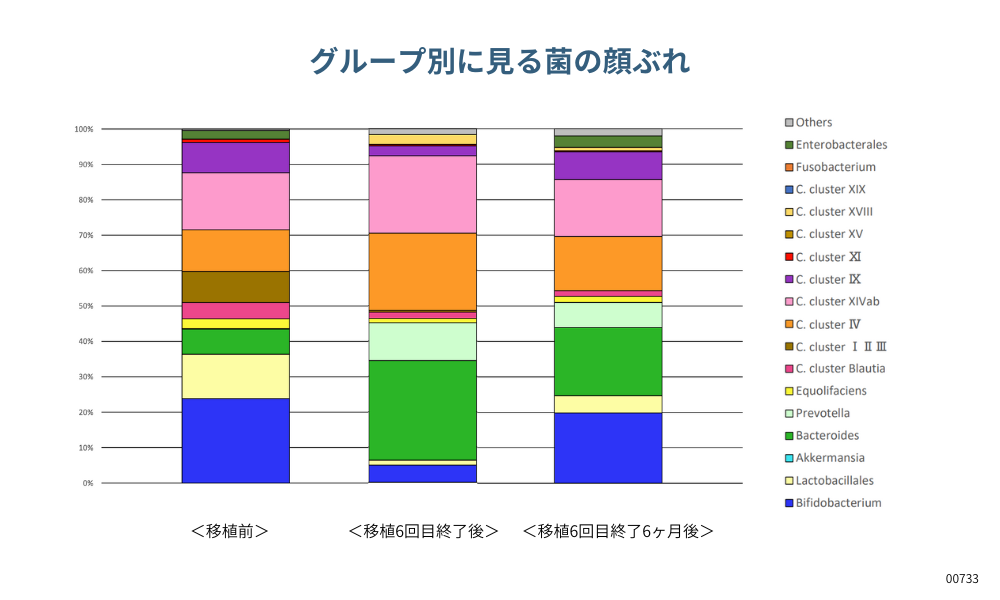
April 08, 2024
Fecal microbiota transplantation in a 50-year-old woman with ulcerative colitis
Introduction of cases 50th generation women Ulcerative colitis summary FMT for ulcerative colitis (UC). After starting FMT, he developed appendicitis, which was relieved by antibiotics. Thereafter, he had a temporary exacerbation (hemorrhage), but gradually improved, which was considered effective for UC. Basic Information Patients : Woman in her 50s Attending physician : Luke’s Ashiya Clinic […]
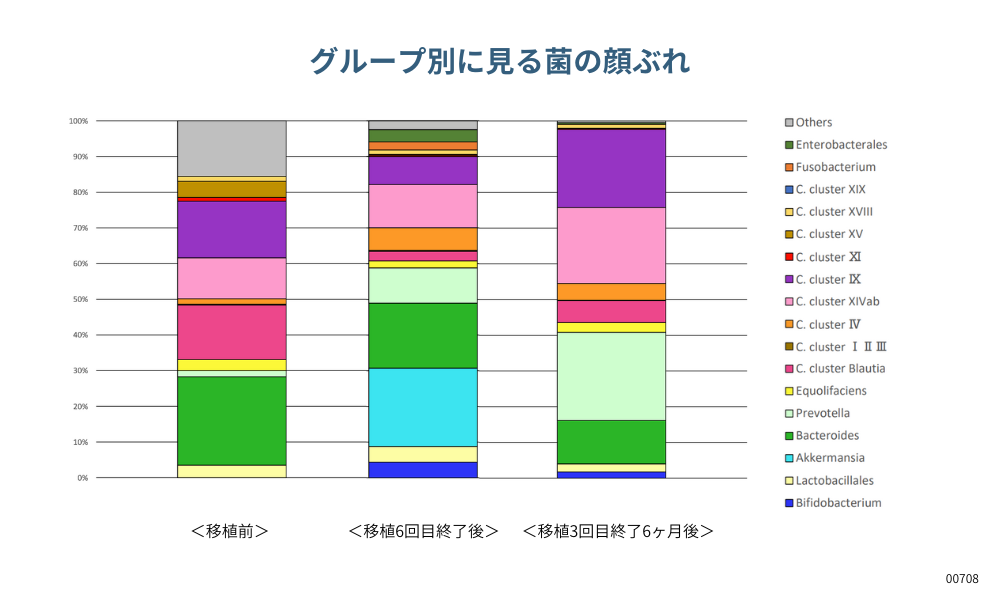
April 08, 2024
Ulcerative colitis (IBS) and small intestinal bacterial growth (SIBO) in a man in his 50s -Case report of fecal microbiota transplantation
Case presentation Male in his 50s with ulcerative colitis (IBS) and small intestinal bacterial growth (SIBO) summary After three transplants, the patient’s symptoms improved slightly, but he is still not satisfied with the results. Basic Information Patients : Male in his 50s Attending physician : Luke’s Ashiya Clinic Medical institution in charge of transplantation : […]





